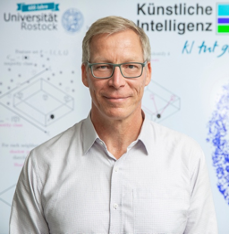The Role of Modelling in the Life Science
Olaf Wolkenhauer
Dept. of Systems Biology & Bioinformatics
University of Rostock, 18051 Rostock, Germany
Twitter: @OlafWolkenhauer
Email: olaf.wolkenhauer@uni-rostock.de
Abstract
The Sars-CoV-2 pandemic has put mathematical modelling into the spotlight. Predictions about the number of new infections have led to political, social and economic decisions of unprecedented proportions. The pandemic has, however, also revealed the limitations and pitfalls with mathematical modelling of complex dynamical systems.
It may seem like a contradiction, but it works: We can represent a complex system by something simpler, a model, which then allows us to (i) understand the mechanisms by which the complex system functions, and (ii) make predictions about its behaviour. How can we simplify something, that we do not understand, in order to understand it? Welcome to the world of modelling in science!
In this seminar, I am going to review mathematical models, including statistical models, machine learning models, graph models, dynamical systems models. The applications of these models range from molecular dynamic simulations, to cellular networks, epidemiology, and climate research. I want to focus on the principal ideas, the opportunities and limitations of systems approaches. I am going to explain the statement “All models are wrong, but some are useful.”
I received my first degrees in systems and control engineering (Hamburg & Portsmouth and his PhD for research in possibility theory with applications to data analysis. I spent over ten years at the University of Manchester Institute of Science and Technology. In 2005, I became a fellow of the Stellenbosch Institute for Advanced Study and holds professorships at Case Western Reserve University, USA and Chhattisgarh Swami Vivekanand Technical University, India. In 2003, I was appointed as professor for systems biology and bioinformatics at the University of Rostock in Germany. Since 2015, I am an elected member of the Foundations in Medicine and Biology review panel of the German Research Foundation (DFG). From 2020, I am also a guest professor at the Leibniz Institute for Food Systems Biology at the Technical University Munich. I am using mathematical modelling, statistical and computational tools to make sense of biological and medical data. With 20 years of experience in interdisciplinary research, I combine data-driven modelling with model-driven experimentation, using a wide range of approaches, from machine learning, statistics, to systems theory. The results of this work support basic biological and medical research, as well as applications in industry.

